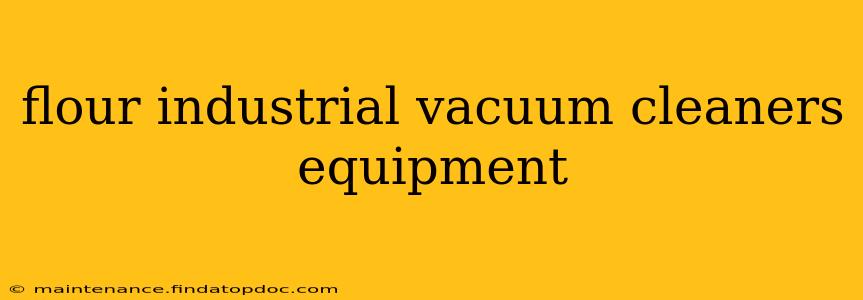Flour dust presents a significant challenge in industrial settings. It's not just messy; it's also highly flammable and can trigger severe respiratory problems. Effective cleaning is paramount for safety and regulatory compliance. This guide explores the crucial aspects of flour industrial vacuum cleaners and the equipment necessary for a clean and safe work environment.
What are the Different Types of Flour Industrial Vacuum Cleaners?
Industrial vacuum cleaners designed for flour handling differ significantly from standard models. The key distinction lies in their ability to handle explosive dusts and ensure operator safety. Several types cater to various needs:
-
Explosion-Proof Vacuum Cleaners: These are the gold standard for flour processing. They are specifically designed and certified to prevent ignition of flammable dusts, incorporating features like explosion-proof motors and specialized filtration systems. These often require regular inspections and maintenance to maintain their safety certifications.
-
High-Efficiency Particulate Air (HEPA) Vacuum Cleaners: While not inherently explosion-proof, HEPA vacuum cleaners capture a very high percentage of flour particles, significantly reducing airborne dust and the risk of respiratory issues. However, they should be used in conjunction with other safety measures in high-risk environments.
-
Central Vacuum Systems: For larger facilities, a central vacuum system offers a comprehensive solution. These systems use a network of pipes to collect dust from various points in the facility, transporting it to a central collection unit. This minimizes dust dispersal and improves overall hygiene.
What Features Should I Look for in a Flour Industrial Vacuum Cleaner?
Choosing the right vacuum cleaner involves careful consideration of several critical features:
-
Explosion-Proof Certification: This is crucial in environments where flour dust poses an explosion risk. Look for certifications from relevant safety authorities.
-
Filtration System: HEPA filters are essential for capturing fine flour particles. Consider the filter's efficiency rating and replacement frequency.
-
Motor Power and Suction: Adequate power ensures efficient dust removal, especially in large or heavily soiled areas.
-
Mobility and Maneuverability: The vacuum cleaner should be easy to maneuver around equipment and in tight spaces. Consider features like swivel casters and lightweight construction.
-
Dust Collection Mechanism: The system for collecting and disposing of the collected flour dust should be safe and easy to use, ideally incorporating sealed containers for safe disposal.
-
Maintenance Requirements: Regular maintenance is crucial for maintaining efficiency and safety. Choose a model with easy access to filters and other components for cleaning and replacement.
How Do I Choose the Right Vacuum Cleaner for My Specific Needs?
Selecting the appropriate flour industrial vacuum cleaner requires assessing several factors:
-
Facility Size and Layout: Large facilities might require a central vacuum system, while smaller operations may benefit from a portable unit.
-
Flour Type and Dust Level: The type of flour and the amount of dust generated will impact the required suction power and filtration efficiency.
-
Budget: Vacuum cleaners range widely in price, from relatively inexpensive HEPA models to highly specialized explosion-proof systems.
-
Safety Regulations: Compliance with local safety regulations and industry standards is paramount.
What are the Safety Precautions When Using Flour Industrial Vacuum Cleaners?
Flour dust presents a significant safety hazard. Always adhere to these precautions:
-
Proper Training: Ensure all operators are properly trained in the safe operation and maintenance of the vacuum cleaner.
-
Regular Inspections: Conduct regular inspections of the vacuum cleaner and its components to ensure everything is functioning correctly.
-
Personal Protective Equipment (PPE): Always use appropriate PPE, including respirators, safety glasses, and gloves.
-
Dust Disposal: Dispose of collected flour dust safely and according to local regulations.
How Often Should I Replace the Filters in My Flour Industrial Vacuum Cleaner?
Filter replacement frequency depends on usage intensity and the type of filter. Consult your vacuum cleaner's manual for specific guidelines, but expect to replace HEPA filters more frequently than standard filters. Regular filter checks and replacement are critical for maintaining effective dust removal and operator safety.
What are the Costs Involved in Owning and Maintaining Flour Industrial Vacuum Cleaners?
The initial purchase price varies significantly depending on the type and features. Ongoing costs include filter replacements, regular maintenance, and potential repairs. Consider these factors when budgeting for a new vacuum cleaner.
By carefully considering these factors and selecting the appropriate equipment, businesses can create a safer and more efficient working environment while minimizing the risks associated with flour dust. Remember, safety should always be the top priority.
